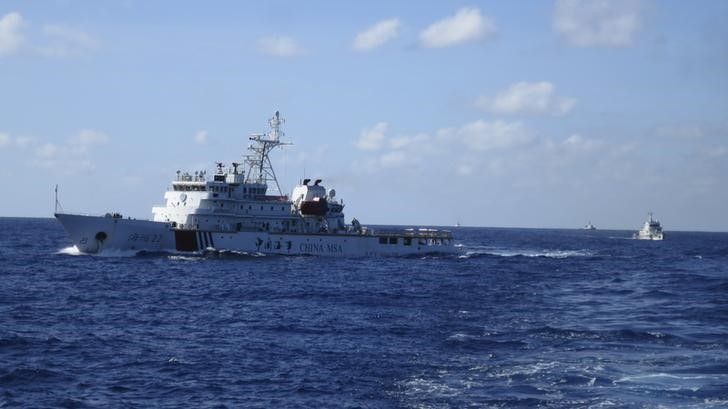China Maritime Dispute: Chinese Coastguard Vessels Patrol Disputed Waters

(Reuters) - China has sent coastguard vessels to disputed waters in the East China Sea after Japanese Prime Minister Shinzo Abe angered Beijing by sending a ritual offering to a Tokyo shrine that honors the dead from Japan's wars.
The uninhabited islands - which Japan controls and calls the Senkaku but which China also claims as the Diaoyu - have inflamed passions in the world's second and third biggest economies.
Relations between them are further aggravated by the respects that Japanese politicians regularly pay at the Yasukuni Shrine, which is widely seen as a symbol of Japan's past militarism.
Three Chinese coastguard vessels - 2305, 2101 and 2112 - patrolled Chinese "territorial waters" near the Diaoyu islands on Saturday, China's State Oceanic Administration said in a terse statement on its website. It gave no further details.
Patrols by vessels and aircraft from both sides near the disputed islands have raised fears of a clash.
China expressed "serious concern" on Friday after Abe sent a small masakaki tree to the shrine. South Korea deplored the offering saying the shrine was "the symbol of glorification of Japan's colonization and invasive war".
On Saturday, three Japanese cabinet members visited the shrine which honors wartime leaders convicted by an Allied tribunal as war criminals along with millions of war dead.
Bitter memories persist of Japan's brutal 1931-45 occupation of parts of China and its 1910-45 colonization of the Korean peninsula.
Both countries feel Japan has never fully atoned for its actions.
Abe outraged Beijing and Seoul by visiting Yasukuni in person in 2013. He said he went not to glorify the war but to honor those who fought and died for their country.
But he has stayed away from the shrine since then, instead sending offerings on key dates, seeking to tread a fine line between his conservative convictions and the diplomatic imperative to improve ties with China.
Expectations have been growing in Japan that Abe will meet Chinese President Xi Jinping for ice-breaking talks on the sidelines of a Nov. 10-11 Asia Pacific Economic Cooperation summit in Beijing.
Abe has also signaled that he wants to meet South Korean President Park Geun-hye at the summit. But the ill will over the legacy of Japan's colonization have cast doubts over that.
(Reporting by Kathy Chen and Benjamin Kang Lim; Editing by Robert Birsel)
© Copyright Thomson Reuters 2024. All rights reserved.







